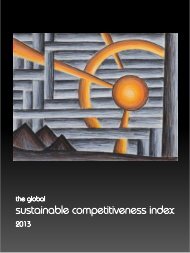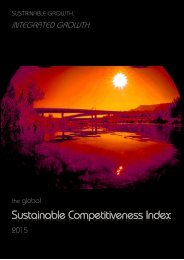Global Competetiveness Report
Create successful ePaper yourself
Turn your PDF publications into a flip-book with our unique Google optimized e-Paper software.
Sustainable Competitiveness<br />
Executive summary<br />
The Sustainable Competitiveness Score is<br />
composed of the four sustainability pillars –<br />
Natural Capital, Resource Intensity,<br />
Sustainable Innovation & Competitiveness,<br />
and Social Cohesion. Individual indicators<br />
and the four pillars have been weighted<br />
according to their relevance, the human<br />
leverage factor, and the accuracy of the<br />
underlying data used. The “human leverage<br />
factor” refers to the time and resource<br />
allocation required to change or improve the<br />
momentary status of the indicator in question.<br />
The Sustainable Competitiveness is, to a small<br />
extent, based on natural capital (beyond the<br />
influence of human leverage), but to a<br />
significant larger extent on human activities<br />
and policies. Provided sufficient political will<br />
and collaboration of the involved players -<br />
authorities, communities, economic entities -<br />
coupled with pragmatic policies beyond<br />
ideology or economic theories, a nation is<br />
able and capable of significantly improving<br />
its Sustainable Competitiveness over time.<br />
However, the absence of intelligent policies<br />
and incentives will lead to diminishing<br />
potential of achieving sustainable<br />
development with all its tangible and<br />
intangible benefits. Countries with a current<br />
high income (GDP per capita) but<br />
comparable low Sustainable Competitiveness<br />
are facing the potential of decline. Lower<br />
income countries with low Sustainable<br />
Competitiveness are likely to face serious<br />
obstacles to improve there current status and<br />
the livelihoods (living standard) of its<br />
populations.<br />
For additional information and detailed<br />
analysis please refer to the Sustainable<br />
Competitiveness section or the full ranking<br />
tables for all 176 countries.<br />
SUSTAINABLE COMPETETIVENESS (selection)<br />
Country Rank Score<br />
Denmark 1 58.8<br />
Sweden 2 58.5<br />
Norway 3 57.6<br />
Austria 4 57.6<br />
Finland 5 57.6<br />
Switzerland 6 56.5<br />
Germany 7 56.2<br />
Netherlands 8 56.2<br />
Japan 9 56.0<br />
Canada 12 55.6<br />
New Zealand 14 54.4<br />
France 15 54.4<br />
Portugal 20 50.3<br />
Singapore 21 50.0<br />
Spain 22 49.9<br />
Australia 23 49.9<br />
Brazil 25 49.5<br />
United Kingdom 26 49.5<br />
Italy 28 49.2<br />
USA 30 48.4<br />
South Korea 33 47.7<br />
Argentina 34 47.5<br />
China 36 47.3<br />
Greece 40 46.8<br />
Poland 42 46.6<br />
Guyana 43 46.2<br />
Sri Lanka 54 44.7<br />
Russia 56 43.9<br />
Egypt 59 43.7<br />
Indonesia 61 43.4<br />
Chile 64 42.9<br />
Malaysia 76 40.3<br />
Turkey 80 39.9<br />
Kuwait 85 39.1<br />
Philippines 86 39.0<br />
Algeria 89 38.9<br />
Vietnam 93 38.6<br />
India 100 38.3<br />
Morocco 116 37.2<br />
Saudi Arabia 120 36.6<br />
Jordan 128 35.6<br />
Bangladesh 129 35.6<br />
Mexico 131 35.4<br />
Nigeria 132 35.4<br />
The <strong>Global</strong> Sustainable Competitiveness Index<br />
11








